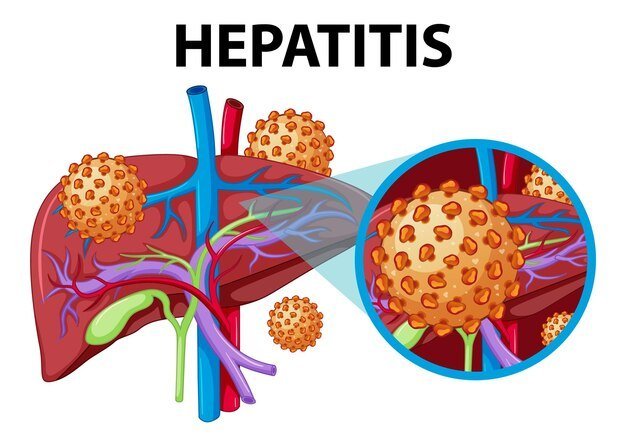Hepatitis A is a highly contagious liver infection caused by the hepatitis A virus (HAV). While it can cause significant discomfort and illness, understanding its Hepatitis A vaccines, symptoms, treatment options, and prevention methods is important for managing and preventing its spread. In this comprehensive guide, we explore into the various aspects of hepatitis A to provide you with the knowledge needed to safeguard yourself and your loved ones.
I. Hepatitis A Symptoms
The symptoms of HAV can range from mild to severe, and they usually appear two to six weeks following viral infection. Common symptoms include:
- Fatigue
- Sudden nausea and vomiting
- Abdominal pain or discomfort, especially around the liver area
- Loss of appetite
- Dark urine
- Jaundice (yellowing of the skin and eyes)
- Clay-colored stools
II. Hepatitis A Vaccine
The hepatitis A vaccine is a highly effective way to prevent the disease. It is recommended for:
- All children at age 1 year
- Travelers to countries with high rates of this HA virus
- People at risk of infection due to their occupation or lifestyle
- Individuals with chronic liver disease
III. Hepatitis A Vaccine Schedule for Adults
The hepatitis A vaccine is typically administered in two doses, with the second dose given six to twelve months after the first. However, for adults who have not been vaccinated previously, an accelerated schedule of two doses given six months apart may be recommended.
IV. Hepatitis A Treatment
While there is no specific treatment for that hepatitis, supportive care can help lessen symptoms and help recovery. Treatment may include:
- Rest
- Adequate hydration
- Nutritious diet
- Avoidance of alcohol and certain medications that can further stress the liver
V. Hepatitis A Transmission
It is primarily spread through the fecal-oral route, often due to:
- Ingestion of contaminated food or water
- Close contact with an infected person
- Poor sanitation and hygiene practices
VI. Hepatitis A Ab
The immune system produces hepatitis A antibodies (Ab) in reaction to HAV infection. Antibody testing can be used to detect immunity or diagnose it.
VII. Hepatitis A Ab Total
The term “Ab total” describes the overall concentration of IgM and IgG hepatitis A antibodies in the blood. Increased concentrations of these antibodies indicate either an ongoing or previous illness or immunization-induced immunity.
VIII. Hepatitis A Causes
The primary cause of this hepatitis is infection with the hepatitis A virus (HAV). The virus is typically transmitted through the ingestion of contaminated food or water or close contact with an infected individual.
IX. Hepatitis A Ab Total Reactive
A reactive hepatitis A Ab total test result indicates the presence of A antibodies in the blood, suggesting either current infection, recent exposure, or immunity due to vaccination or past infection.
X. Hepatitis A Virus
The hepatitis A virus (HAV) is a small, RNA virus belonging to the Picornaviridae family. It is easily transmissible because of its great resistance to environmental factors and ability to persist on surfaces for extended periods.
XI. Hepatitis A vaccine and B Vaccine
There are combination vaccines that offer protection against the HA and Hepatitis B viruses. For those who are at risk of both illnesses in particular, these vaccinations simplify and provide convenience during the vaccination process.
XII. Prevention
Preventing hepatitis involves several key strategies, including:
- Vaccination: Ensure routine vaccination, particularly for high-risk individuals.
- Good hygiene: Practice thorough handwashing, especially after using the restroom and before handling food.
- Safe food and water: Consume only properly cooked and clean food and water, particularly when traveling to regions with poor sanitation.
- Avoidance of high-risk behaviors: Minimize contact with potentially infected individuals and practice safe sex.
XIII. Hepatitis A Specialists
Healthcare providers with expertise in infectious diseases, gastroenterology, or hepatology can offer modified care and assistance to patients with HAV or in need of specific treatment.
XIV. Hepatitis A Antibody Positive
A positive hepatitis A antibody test result indicates the presence of antibodies against the HAV in the blood. Depending on the context, it may suggest immunity due to vaccination or past infection, or it may indicate current infection or recent exposure.
Conclusion
Hepatitis A is a preventable disease, and understanding its hepatitis A vaccines, symptoms, treatment options, and prevention methods is important for modifying its impact. By staying informed and adopting preventive measures, individuals can reduce the risk of hepatitis infection and contribute to overall public health efforts to control the spread of this transmittable virus. If you have concerns about HA or need guidance on vaccination or treatment, consult with healthcare professionals for personalized advice and care.
Diet and Precautions:
| Diet for HA Patient | Precautions for HA Patient |
|---|---|
| Consume small, frequent meals | Avoid alcohol consumption |
| Focus on easily digestible foods like boiled vegetables, fruits, and lean proteins | Wash hands thoroughly after using the bathroom and before preparing or eating food |
| Drink plenty of fluids, such as water, herbal teas, and clear broths | Avoid sharing personal items such as toothbrushes or razors |
| Limit intake of fatty, greasy, and spicy foods | Ensure food is properly cooked and avoid raw or undercooked seafood |
| Include sources of vitamin C in the diet, such as citrus fruits, to support liver function | Be cautious with medications and consult a healthcare provider before taking any over-the-counter drugs or supplements |
| Avoid raw or undercooked shellfish | Get vaccinated against HAV if not already vaccinated |
| Opt for pasteurized dairy products | Rest adequately and avoid strenuous activities |
| Steer clear of foods with high sodium content | Practice safe sex or use condoms to prevent transmission of HA virus |
| Avoid processed foods and sugary snacks | Maintain good hygiene, including keeping living areas clean and avoiding contact with potentially contaminated surfaces |
| Incorporate whole grains and legumes for fiber and energy | Avoid contact with blood or bodily fluids of others, especially if you have open sores or cuts |
| Eat foods rich in antioxidants to support overall health | Follow up with healthcare provider for regular check-ups and monitoring of liver function |




1 thought on “Hepatitis A vaccine, causes, symptoms and Treatment”